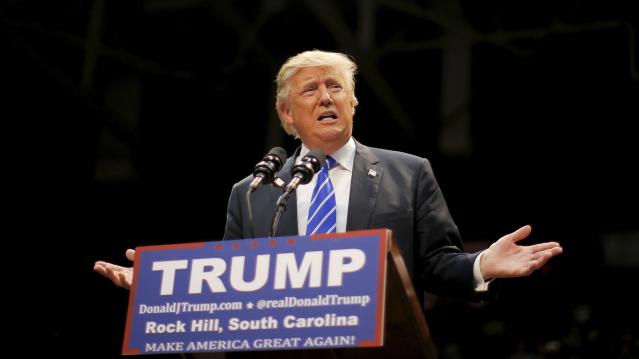How CNN Is Cashing In on Trump-Mania

Fox News’s GOP debate last month generated blockbuster ratings — 24 million viewers saw Donald Trump and the other top Republican presidential contenders mix it up, making it the most-watched non-sports cable show ever. Now Fox News rival CNN is poised to cash in on that success.
The news network is asking advertisers to pay 40 times its usual rate, or as much as $200,000 for a 30-second commercial, during the second GOP debate, which it is scheduled to host on Sept. 16, according to Ad Age. CNN is also charging $50,000 to $60,000 for commercials airing that day in the earlier debate between second-tier candidates.
Related: Two New Polls Show Exactly Why Donald Trump Is Winning
Ad Age says CNN isn’t expected to pull in quite the same level of viewership as Fox News did, but even if the next primetime debate fails to match the earlier numbers, it is still likely to be the most-watched debate CNN has ever aired. The network can thank Trump for that, just as it could thank another outspoken and unpredictable GOP phenomenon for helping to set its previous debate record: In 2008, almost 11 million viewers tuned in to the vice presidential debate between Joe Biden and — you betcha! — Sarah Palin.
If the Palin example holds, news networks aren’t going to be the only ones to benefit from the Trump surge. “Saturday Night Live” saw its viewership and buzz soar in 2008 as Tina Fey’s impersonation of Palin became a sensation in its own right. And when the former Alaska governor appeared on SNL in October 2008, the show drew its highest ratings in 14 years.
Related: Trump Is Still Surging — Here’s Who Can Stop Him
The new season of SNL starts Oct. 3, so it’s probably a safe bet that Lorne Michaels — and other executives at NBC, even after the network dumped Trump from The Celebrity Apprentice in the wake of his comments about Mexican immigrants — are rooting for Trump mania to keep going for another month, at least. In the meantime, NBC announced Tuesday that Trump will appear on “The Tonight Show” next week.
Top Reads from The Fiscal Times:
- Doctors to Trump: Deporting Illegal Immigrants Would Be Bad for U.S. Health
- How Much Does Our Social Safety Net Cost? $742 Billion a Year and Rising
- If Clinton Loses Her Security Clearance, Could She Still Be President?
Increasing Number of Americans Delay Medical Care Due to Cost: Gallup

From Gallup: “A record 25% of Americans say they or a family member put off treatment for a serious medical condition in the past year because of the cost, up from 19% a year ago and the highest in Gallup's trend. Another 8% said they or a family member put off treatment for a less serious condition, bringing the total percentage of households delaying care due to costs to 33%, tying the high from 2014.”

Number of the Day: $213 Million

That’s how much the private debt collection program at the IRS collected in the 2019 fiscal year. In the black for the second year in a row, the program cleared nearly $148 million after commissions and administrative costs.
The controversial program, which empowers private firms to go after delinquent taxpayers, began in 2004 and ran for five years before the IRS ended it following a review. It was restarted in 2015 and ran at a loss for the next two years.
Senate Finance Chairman Chuck Grassley (R-IA), who played a central role in establishing the program, said Monday that the net proceeds are currently being used to hire 200 special compliance personnel at the IRS.
US Deficit Up 12% to $342 Billion for First Two Months of Fiscal 2020: CBO

The federal budget deficit for October and November was $342 billion, up $36 billion or 12% from the same period last year, the Congressional Budget Office estimated on Monday. Revenues were up 3% while outlays rose by 6%, CBO said.
Hospitals Sue to Protect Secret Prices

As expected, groups representing hospitals sued the Trump administration Wednesday to stop a new regulation would require them to make public the prices for services they negotiate with insurers. Claiming the rule “is unlawful, several times over,” the industry groups, which include the American Hospital Association, say the rule violates their First Amendment rights, among other issues.
"The burden of compliance with the rule is enormous, and way out of line with any projected benefits associated with the rule," the suit says. In response, a spokesperson for the Department of Health and Human Services said that hospitals “should be ashamed that they aren’t willing to provide American patients the cost of a service before they purchase it.”
See the lawsuit here, or read more at The New York Times.
A Decline in Medicaid and CHIP Enrollment

Between December 2017 and July 2019, enrollment in Medicaid and the Children's Health Insurance Program (CHIP) fell by 1.9 million, or 2.6%. The Kaiser Family Foundation provided an analysis of that drop Monday, saying that while some of it was likely caused by enrollees finding jobs that offer private insurance, a significant portion is related to enrollees losing health insurance of any kind. “Experiences in some states suggest that some eligible people may be losing coverage due to barriers maintaining coverage associated with renewal processes and periodic eligibility checks,” Kaiser said.

